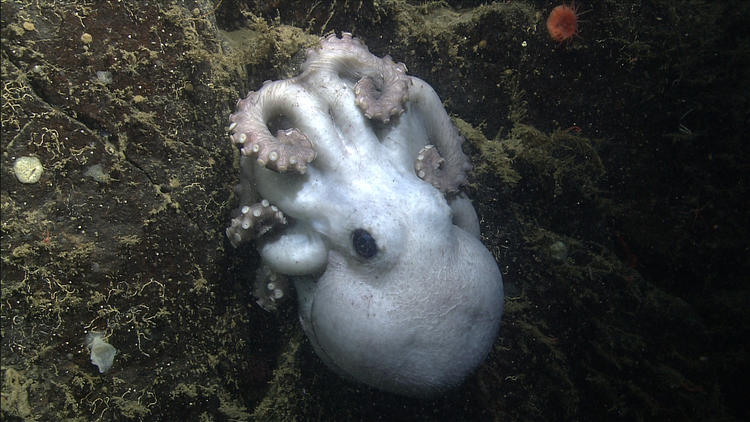Deep-sea octopus keeps record-breaking four and a half year vigil over her eggs
The dedicated cephalopod was spotted 1.4km under the surface of the Pacific Ocean, sweeping fresh water over her eggs and warding off predators

Scientist have found what must be nature’s most dedicated mother – a deep sea octopus that tended to her clutch of 160 eggs for nearly four and a half years, most likely not eating once during the astonishing vigil.
The discovery, published in the journal PLOS one, is double the longest brood time previously observed in the animal kingdom, with scientists attributing the 53-month wait to the slow development of the octopus embryos caused by the icy waters of the Pacific Ocean.
The deep-sea octopus mum (Graneledone boreopacifica) was first spotted by a team of divers from the Monterey Bay Aquarium Research Institute (MBARI) in May 2007, just a few days before she selected a brooding site and fixed her eggs to a rock face.
"The first time that we dropped back down [...] and realised that she had gone up and laid a clutch of eggs, it was very exciting,” lead researcher Dr Bruce Robison told the BBC. “No-one had ever had the good fortune to come upon the beginning of a brooding period."
When the team first saw the octopus Tony Blair and George W. Bush were still in power and Rihanna had just had her first UK number one with Umbrella. The team revisited the courageous mother 18 times over the next four and a half years, identifying her by a scar on the ‘armpit’ of one her legs.
"We found her there again and again and again, past the point that anybody expected she'd persist,” said Dr Robison. "It got to be like a sports team we were rooting for. We wanted her to survive and to succeed."
Finally in October 2011, as Apple launched the iPhone 4s and Ryan Gosling took brooding intensity to new heights in neo-noir thriller Drive, the team returned to find the octopus had disappeared leaving behind only empty egg case fixed to the rocks.
Dr Robison said that it was common for deep sea octopuses to guard their eggs for months at a time, but that a vigil of this length was extraordinary. Like most octopus mothers, it's likely that the cephalopod died soon after her babies hatched, exhausted by the effort of keeping them alive.
The intrepid mother most likely didn’t eat for the entire time, and although the team from MBARI saw crabs and shrimps scuttle past her during their observations, she never attempted to grab them for a snack (normal behaviour for an octopus) and instead only shooed them away from her eggs.
This 53 month brooding routine smashes the previous record of 20 months held by the giant red shrimp. In both cases the lengthy wait for eggs to hatch is due to the icy temperatures of the water, which has the dual effect of slowing down the animals’ metabolism and the development of their babies.
Subscribe to Independent Premium to bookmark this article
Want to bookmark your favourite articles and stories to read or reference later? Start your Independent Premium subscription today.

Join our commenting forum
Join thought-provoking conversations, follow other Independent readers and see their replies